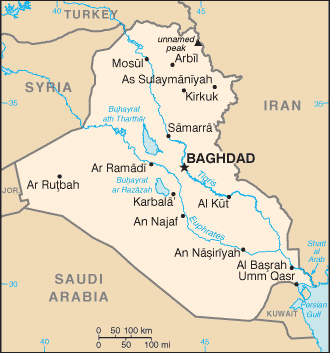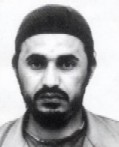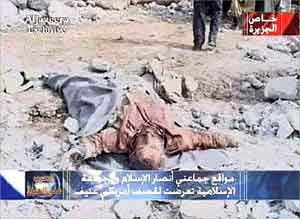|
Ansar al-IslamLong before September 11, al Qaeda had been transforming the shape of terrorist groups, working with dozens of groups under different names, which eventually became hundreds of groups with dozens of members each.After September 11, that process accelerated dramatically, as Osama bin Laden's terrorist network began to feel the heat that only a massive and successful terrorist attack can produce.
In the northern part of Iraq, an ethnic minority called the Kurds had been getting screwed for several decades under the rule of Saddam Hussein. Caught in the middle of the decade-long Iran-Iraq War, Kurdish villages were massacred by Saddam using nerve gas the dictator had obtained from the United States and the Britain. So the Kurds were an unhappy bunch. Late in the summer of 2001, some Kurds crossed the border into Iran to see what they could do about getting some help. Their goal was to get rid of Saddam Hussein and replace his government with an Islamic theocracy, similar to the Taliban or the kingdom of Saudi Arabia. Thus was Ansar al-Islam born. A modest birth, at that. In December 2001, the organization numbered around 350 people, give or take a couple dozen. From this modest base, the group swelled to about 800 people. Many of the members trained in al Qaeda's Afghanistan camps; some may have fought there against the Soviets during the 1980s. Ansar's enemies — and its terrorist activities — were directed first against its fellow Kurds, who were not sufficiently Islamic for Ansar's taste, and then against the Saddam regime. Given these rather parochial concerns, you wouldn't think Ansar al-Islam would even rise to the notice of a superpower. And yet... Ansar had barely made it out of the gate when the U.S. invaded Afghanistan. al Qaeda suddenly had other things to worry about, despite its no-doubt deep and enthusiastic commitment to Islamicizing an already half-Islamic ragtag group of nomads in desolate Northern Iraq. The party had barely begun, and it was already over...
As Afghanistan became inhospitable for terrorists (well, sort of), some of them left the country. One such emigrant was Abu Musab al-Zarqawi, whom the U.S. describes as an "al Qaeda-linked operative." Zarqawi went to Iran some time in late 2001 or early 2002, and from there he traveled to Kurdish Iraq. It is within the subsequent period that things get murky. U.S. officials made a series of fairly extreme claims about what Ansar was up to from 2002 through early 2003. They claimed Zarqawi staged attacks on Turkey from an Ansar stronghold. More significantly, the U.S. claimed that Zarqawi set up a chemical weapons training plant in the region. According to the State Department, Ansar was "working steadily to produce toxic substances which are ready for deployment." These toxic substances and other Iraqi WMDs were mysteriously absent when U.S. invasion forces stormed into the country. The chemical plant was based in an Ansar camp in Northern Iraq. Now, there's a funny little story about this particular camp. According to an investigative report by NBC News, the chemical plant could easily have been bombed by the U.S., on at least three separate occasions, if only the White House had wanted to. The region of Iraq where the Ansar camp was located was not controlled by Saddam, and the Air Force flew over it regularly.
The Pentagon drew up still another attack plan, and for the third time, the National Security Council killed it. Military officials insist their case for attacking Zarqawi’s operation was airtight, but the administration feared destroying the terrorist camp in Iraq could undercut its case for war against Saddam.And indeed, the camp (which could have been totally obliterated without an invasion) would be a key part of the U.S. case for war. One month after the third attack plan was aborted, U.S. Secretary of State Colin Powell told the United Nations that Ansar's presence in Iraq was evidence that Saddam was working fist in glove with al Qaeda, and thus the United States was morally justified in invading Iraq... for this and so many other reasons. "Baghdad has an agent in the most senior levels of the radical organization Ansar al-Islam that controls this corner of Iraq," Powell intoned in deep, foreboding tones. "In 2000, this agent offered al Qaeda safe haven in the region." The problem with this claim may seem obvious. Why would Saddam offer succor to a terrorist group committed to overthrowing his own government? The most probable answer to that question is also the most obvious: He just didn't. But it's not outside the realm of possibility, because a funny thing was happening to Ansar Al-Islam. While it still used the same mailing address, so to speak, the group was slowly being displaced. The original members, whose eyes only really lit up when they talked about Kurdistan, were gradually being displaced by imported fighters associated with Zarqawi. After the U.S. invasion, the original Ansar members fled the country. Many went to Iran, which didn't want them and made life uncomfortable. Many members were shot, captured or killed by Iranian authorities, invading U.S. forces or the mainstream Kurds.
The exact number of attacks carried out by Ansar is still unclear, however. American forces in the region have begun reflexively blaming Zarqawi for virtually everything that goes wrong in Iraq, without coughing up much evidence to support these claims. Zarqawi himself, perhaps seeing a public relations opportunity, has gleefully accepted responsibility for virtually every terrorist act carried out in Iraq since the occupation began. The difficulty lies in determining just how connected Zarqawi and Ansar really are. U.S. authorities produced a letter in February 2004 which they claimed was a note from Zarqawi to al Qaeda outlining his strategy in Iraq and asking for reinforcements. On the one hand, a lot of experts think the letter was a forgery, especially since it conveniently reinforced several American claims about al Qaeda's presence in Iraq. On the other hand, if it was a forgery, it was a pretty careless one since the letter inadvertently forgot to connect Ansar al-Islam either to al Qaeda or to Saddam. Whatever. As of today, Ansar al-Islam is a thriving terrorist organization that does not substantially resemble the original group. Kurdish issues are no longer its focus, and the organization frequently hits Iraqis elsewhere in the country, specifically Shi'ite Muslims, with suicide bombings, regular bombings and plain old shootings. The group has also taken on an international flavor, and is suspected of playing a role on the 3/11 bombing in Madrid and terror cells in Morocco and Italy. Foreign fighters and new recruits have largely overrun the original membership. Ansar's bank accounts and recruitment offices are almost certainly overflowing in the wake of garish torture stories emerging from the Abu Ghraib prison, where Iraqi prisoners were subjected to extreme physical and sexual abuse from U.S. soldiers. Better hope they really didn't have those chemical weapons...
|
 Under pressure, al Qaeda-linked groups fragmented further. Operatives moved from country to country, striking new alliances and taking on new names. Ansar al-Islam was one such group.
Under pressure, al Qaeda-linked groups fragmented further. Operatives moved from country to country, striking new alliances and taking on new names. Ansar al-Islam was one such group.  Or was it?
Or was it? In January 2003, London police broke up a ricin lab apparently connected to the plant. According to NBC:
In January 2003, London police broke up a ricin lab apparently connected to the plant. According to NBC: In the wake of the invasion, a flurry of new attacks have been credited to Ansar, including many of the most devastating suicide attacks on U.S. troops. Presumably under Zarqawi's leadership, Ansar has been tied to hundreds of deaths in dozens of attacks since the invasion began. However, the vast majority of those attacks have been against Iraqis, rather than Americans or other coalition members, including Iraq's Shi'ite Muslim community (Ansar members are Sunnis).
In the wake of the invasion, a flurry of new attacks have been credited to Ansar, including many of the most devastating suicide attacks on U.S. troops. Presumably under Zarqawi's leadership, Ansar has been tied to hundreds of deaths in dozens of attacks since the invasion began. However, the vast majority of those attacks have been against Iraqis, rather than Americans or other coalition members, including Iraq's Shi'ite Muslim community (Ansar members are Sunnis).